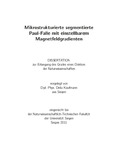Citation link:
https://nbn-resolving.org/urn:nbn:de:hbz:467-6033| DC Field | Value | Language |
|---|---|---|
| dc.contributor.author | Kaufmann, Delia | - |
| dc.date.accessioned | 2019-09-02T09:59:24Z | - |
| dc.date.available | 2012-02-28T12:12:12Z | - |
| dc.date.available | 2019-09-02T09:59:24Z | - |
| dc.date.issued | 2011 | - |
| dc.description.abstract | Lasergekühlte Ionenketten in mikrostrukturierten Paul-Fallen (Mikrofallen) bieten ein großes Potential für Anwendungen in den Quanteninformationswissenschaften. Sie können in einer dekohärenzarmen Umgebung präpariert und manipuliert, und ihre Zustände mit einer Effizienz von fast 100% detektiert werden. Mit zusätzlichen Magnetfeldgradienten ist es möglich, die Ionen im Frequenzraum zu adressieren und zu koppeln (MAGIC-Methode - MAgnetic Gradient Induced Coupling). In dieser Arbeit wurde eine neuartige Mikrofalle mit integrierten Elektromagneten entwickelt, in Betrieb genommen und charakterisiert. Das durch die integrierten Elektromagnete erzeugte steuerbare Magnetfeld wurde darauf optimiert, am Ort der Ionen einen möglichst großen Magnetfeldgradienten zu erzeugen. Die Mikrofalle besteht aus drei übereinander liegenden Lagen. Die äußeren Lagen erzeugen das Fallenpotential, durch die mittlere Fallenlage wird der Magnetfeldgradient erzeugt. Mit insgesamt 33 Elektrodenpaaren können die Ionen entlang der Fallenachse bewegt und ihre Spin-Spin Kopplung kontrolliert werden. Die Mikrofalle wurde auf einem mit Dickschichttechnik bedruckten Keramikblock montiert, der sowohl alle elektrischen Anschlüsse für die Mikrofalle bereit stellt, als auch als Vakuumdurchführung dient. Mit dieser für Anwendungen mit Ionenfallen neuartigen Technologie wurde ein Vakuum im niedrigen 10 -11 mbar-Bereich erzielt. In der Mikrofalle wurden 172 Yb + -Ionen gespeichert, über 2mm transportiert und im Magnetfeldgradienten der Elektromagnete manipuliert. Einzelne Ionen wurden als Magnetfeldsonden benutzt, auf diese Weise wurden relative Genauigkeiten von Delta B/B 0 = 7 · 10 -6 erreicht. Die Adressierung zweier Ionen im Magnetfeldgradienten mittels der MAGIC-Methode wurde demonstriert. | de |
| dc.description.abstract | Strings of laser cooled ions stored in microstructured Paul traps (microtraps) have promising potential for quantum information science. They provide a system which can be screened from a decohering environment, accurately prepared, manipulated and state selectively detected with efficiency close to unity. Magnetic field gradients allow for addressing trapped ions in frequency space. Furthermore, coupling of the ions' motional and spin states and long range spin-spin coupling of the ions' internal states are induced by such a gradient. This method is called Magnetic Gradient Induced Coupling, MAGIC. In this thesis, the design, construction and first characteriszation of a novel microtrap with an integrated solenoid is reported. The solenoid is designed to create a high magnetic field gradient per dissipated heat. The microtrap consists of three layers stacked onto each other. The outer layers provide a trapping potential, while the inner layer creates the switchable magnetic field gradient. Another specialty of this trap is the 33 pairs of DC electrodes, allowing to move the ions along the trap axis and to adjust the range and the strength of the ions' spin-spin interactions. The microtrap is fixed on top of a ceramic block that provides the necessary electrical connections via thick film printed wires, a technique adopted in the context of microtraps for the first time, and in addition acts as a vacuum interface. The volume of the vacuum chamber is quite small, allowing for pressures in the low 10 -11 mbar range. In this microtrap, 172 Yb + -ions are trapped, cooled and shuttled over a distance of about 2mm. Trapped ions are used as magnetic field gradient probes, with a relative magnetic field precision of Delta B/B 0 = 7 · 10 -6 . The addressing of two ions with the MAGIC method in the solenoid's magnetic field gradient is demonstrated. | en |
| dc.identifier.uri | https://dspace.ub.uni-siegen.de/handle/ubsi/603 | - |
| dc.identifier.urn | urn:nbn:de:hbz:467-6033 | - |
| dc.language.iso | de | de |
| dc.rights.uri | https://dspace.ub.uni-siegen.de/static/license.txt | de |
| dc.subject.ddc | 530 Physik | de |
| dc.subject.other | Segmentierte Paul-Falle | de |
| dc.subject.other | Quanteninformationswissenschaft | de |
| dc.subject.other | Magnetfeldgradient induzierte Kopplung | de |
| dc.subject.other | segmented Paul trap | en |
| dc.subject.other | quantum information science | en |
| dc.subject.other | magnetic gradient induced coupling | en |
| dc.subject.swb | Paul-Falle | de |
| dc.subject.swb | Qubit | de |
| dc.subject.swb | Quanteninformatik | de |
| dc.title | Mikrostrukturierte segmentierte Paul-Falle mit einstellbarem Magnetfeldgradienten | de |
| dc.title.alternative | Micro structured segmented Paul trap with tunable magnet field gradient | en |
| dc.type | Doctoral Thesis | de |
| item.fulltext | With Fulltext | - |
| ubsi.date.accepted | 2012-02-02 | - |
| ubsi.publication.affiliation | Fakultät IV - Naturwissenschaftlich-Technische Fakultät | de |
| ubsi.subject.ghbs | UHEQ | - |
| ubsi.type.version | publishedVersion | de |
| Appears in Collections: | Hochschulschriften | |
Files in This Item:
| File | Description | Size | Format | |
|---|---|---|---|---|
| kaufmann.pdf | 46.93 MB | Adobe PDF |  View/Open |
This item is protected by original copyright |
Page view(s)
580
checked on Dec 3, 2024
Download(s)
571
checked on Dec 3, 2024
Google ScholarTM
Check
Items in DSpace are protected by copyright, with all rights reserved, unless otherwise indicated.

